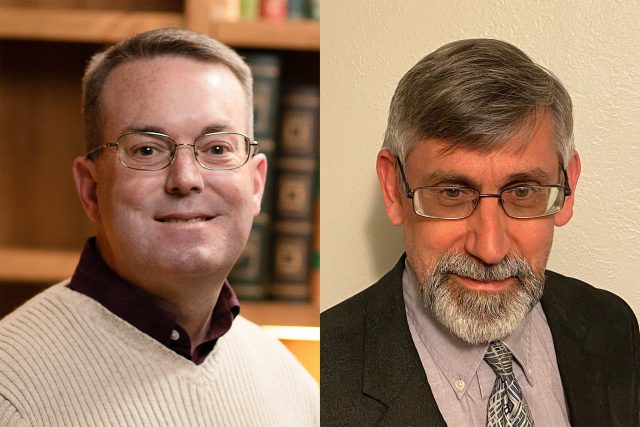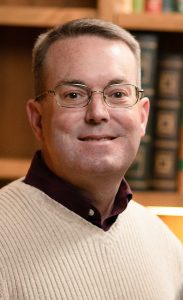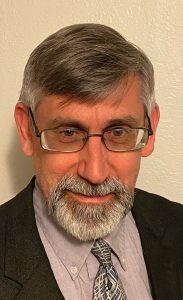
Craig Morris (left), whose career spans almost three decades as an intelligence officer with the U.S. Air Force, and Kevin Riehle, whose background includes stints with the FBI and Defense Intelligence Agency, have both joined UM as instructional associate professors.
OXFORD, Miss. – Two new Center for Intelligence and Security Studies faculty members bring to University of Mississippi classrooms more than 60 years of combined experience with the U.S. intelligence community and military.
Craig Morris, whose career spans almost three decades as an intelligence officer with the U.S. Air Force, and Kevin Riehle, whose background includes stints with the FBI and Defense Intelligence Agency, have both joined UM as instructional associate professors at the center.
Founded in 2008, the Center for Intelligence and Security Studies, or CISS, prepares students for intelligence and security careers by focusing on the critical thinking, writing and briefing skills used by the 18 organizations that form the U.S. intelligence community.
“Their professional expertise will be an incredible resource for students considering careers in intelligence, national security and defense policy,” said Shaio Zerba, director of the center. “In addition to their distinguished careers in defense, intelligence and cybersecurity, their experience as educators at the United States Air Force Academy and National Intelligence University will be a tremendous asset in developing the curriculum for our new global security studies minor.”
Added this fall, the minor program will supply Ole Miss students with the skills and educational background for entry-level employment in the national security sector.
Morris retired from the Air Force in 2020 after a 29-year career spent in intelligence and education. His last assignment was as an assistant professor of history at the U.S. Air Force Academy, where he taught courses on the history of technology, military history and world history.
“When I retired from the Air Force, I was looking for a first-rate civilian institution that would let me combine my passion for history and national security, while also letting my family move closer to relatives in Louisiana,” he said. “Ole Miss fit the bill perfectly. Several universities have programs in intelligence studies, national security studies or cybersecurity studies, but Ole Miss is one of very few that is developing an integrated program to produce the future national security leaders.
“I became a strong believer in the Center for Intelligence and Security Studies program interweaving the three disciplines into a broad understanding of the key issues today’s intelligence and national security professionals face. I wanted to be part of that program.”
Riehle’s last intelligence community posting was as a senior policy officer in the Office of the Undersecretary of Defense for Intelligence.
He was an associate professor at the National Intelligence University before joining UM.
“I am impressed with the Center for Intelligence and Security Studies and its philosophy of offering a minor that provides a basis in the intelligence world, while also allowing a student to develop a skill such as a language or STEM specialization,” Riehle said. “I agree with the CISS model that gives students a sought-after skill while simultaneously building an intelligence foundation.
“I truly enjoy both teaching and research, and my time at the National Intelligence University gave me opportunities to do both. I look forward to working with students at the University of Mississippi while also continuing research into intelligence systems.”
Turning to Teaching

Craig Morris, who recently joined the university’s Center for Intelligence and Security Studies, retired from the Air Force in 2020 after a 29-year career spent in intelligence and education. Submitted photo
This semester, Morris is teaching a new CISS course, ISS 135: Introduction to Global and National Security, which covers the national security process by exploring global, regional and nontraditional threats to American security. He also is teaching ISS 499: Intelligence and Security Studies-Capstone, where students complete the minor by producing an open-source intelligence assessment related to the regional, technological, disease and climate-based threats identified in the 2021 Interim National Security Strategic Guidance.
During his nearly three-decade career with the Air Force, Morris held various assignments both in the U.S. and overseas, including serving on command- and operational-level intelligence staffs and gaining experience with intelligence and cyber operations planning, analysis, targeting and curriculum development.
He draws on his intelligence career and experience in the classroom, including focusing on teaching skills such as critical thinking, communications and leadership.
“Critical thinking is the heart of an intelligence professional, as they must process myriads of information to find the important elements,” he said. “Then they must communicate their analysis concisely and powerfully to decision-makers.
“Finally, intelligence and national security are team sports. A good intelligence professional must bring out the best in others to ensure the entire group succeeds. All of our classes in the CISS are designed to build those skills in our students.”
Morris earned a bachelor’s degree in political science from the University of Louisiana at Lafayette, a master’s in international relations from Troy University and a Ph.D. in the history of technology at Auburn University. He also earned a master’s in national security and strategic intelligence from the Joint Military Intelligence College and a master’s in operational military art from the Air Command and Staff College.
His academic career started in 2009 as an instructor with the Air Command and Staff College. He’s also taught at Auburn University and was an adjunct professor of history at Colorado Community College.
His courses taught include national security strategy, technology and war, space history and more.
“I guess you could say education is our family business,” Morris said. “My mother was an English teacher and my father a history teacher, so it is in my blood. But I realized I had a passion for teaching when the Air Force put me in charge of Intelligence Training in San Angelo, Texas.
“Turning the next generation of new airmen and lieutenants into intelligence professionals was my favorite assignment in a lengthy career. It started a lifelong love of teaching that I was lucky to continue at the Air Force’s Command and Staff College, the Air Force Academy and now at Ole Miss.”
He’s the author of “The Origins of American Strategic Bombing Theory” and a co-editor of “The Harmon Memorial Lectures in Military History, 1988-2017.” He’s also written several papers and book reviews and appeared on Federal Emergency Management Agency and Department of Homeland Security panels.
Morris’ research and teaching fields include the history of technology, intelligence and national security, and world and military history.
“Despite the old saying, history does not repeat,” he said. “Still, there are lessons to be learned from the past. Studying how past policies and crises played out can help us understand the causal factors at work during those events.
“It also allows our students to practice their critical thinking skills. I like to use case studies from the past to put students into a national security situation and see how they respond. It is a powerful tool to help them practice the skills they will need as intelligence and national security professionals.”
What Intelligence Defectors Teach Us

Kevin Riehle, who worked for the FBI as a Russian language specialist and an intelligence operations specialist during the 1990s and later worked in counterintelligence with the U.S. European Command, has joined the faculty in the Center for Intelligence and Security Studies. Submitted photo
With a doctorate in war studies from King’s College London, Riehle earned his bachelor’s degree in Russian and political science from Brigham Young University and his master’s in strategic intelligence from the Joint Military Intelligence College.
He’s proficient in Russian and has written a book, “Soviet Defectors: Revelations of Renegade Intelligence Officers, 1924-1954,” and several articles and presented papers and lectures on Russian intelligence and intelligence community defectors, especially during the Cold War.
“One of the objectives in my research is to use intelligence defectors as a window into the inner thinking of a closed national security decision-making system,” Riehle said. “Countries that accept defectors have traditionally applied defector information to counterespionage operations to identify spies within their midst. That is important.
“But defectors also offer broader knowledge about their government’s threat perceptions, national security priorities, strengths and vulnerabilities that we can use as we develop policies in relation to their country. What is typically considered counterintelligence information also provides other strategic benefits. I have tried to draw those additional benefits out in my research.”
Riehle’s military service includes 30 years in intelligence in the U.S. Army Reserve and National Guard and Navy Reserve. He worked for the FBI as a Russian language specialist and an intelligence operations specialist during the 1990s and later worked in counterintelligence with the U.S. European Command.
He joined the Defense Intelligence Agency in 2008, working mostly in a counterintelligence capacity before joining the Office of the Undersecretary of Defense for Intelligence.
At the National Intelligence University, Riehle was the chair of the Collection, Analysis and Counterintelligence Department, and coordinated the Russia/Eurasia program and concentration while teaching courses on Russia, counterintelligence and more.
At UM, Riehle is teaching ISS 351, Advanced Analytics I, the first course in the intelligence and security studies minor that helps students develop the critical thinking and writing skills that the 18 organizations of the U.S. intelligence community expect in its employees.
“An intelligence community professional needs to look at the world as objectively as possible, setting aside personal or political biases; to thirst for the truth no matter where it leads,” he said. “An intelligence community professional also needs resilience to recognize threats where they exist without becoming jaded.
“Intelligence is focused on threats to national security, and those threats come in many forms, sometimes violent. Intelligence community professionals need to maintain balance and always being alert to the possibility of emerging threats, while avoiding the anxiety that comes from imagining danger lurking behind every tree.”